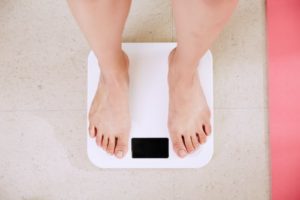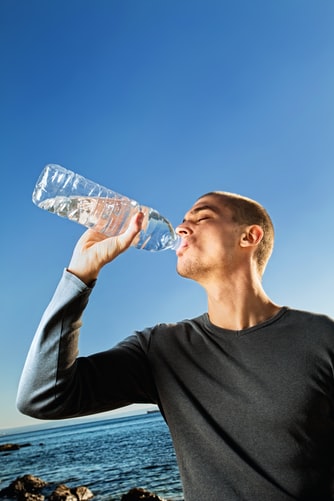4 Small Steps For Big Health Change – Part 1 – Water
Alright, friends! Let’s be real with each other. We’re about to exit one hell of a year and head into, well, who really knows! Lots of us are focusing on what we can control, and that might look like writing down all kinds of fancy new year resolutions. But, let’s get real honest – they rarely work out! Despite our best intentions We either fail to meticulously plan for our success, real life hits and we become our last priority, or priorities shift and those resolutions are quickly forgotten. Success happens in smaller steps that are built upon. For example, focusing on drinking enough water and the benefits to our health with just starting there.
So this year, let’s commit to doing something different. Something sustainable! Buckle up, love, because I’m about to give you 4 small things to do that will make a huge change in your health in this 4 part series.
This month, let’s focus on water.
Break It Down

Here are some approximate breakdowns for you;
- Brain – 80% water
- Muscles (including your heart) – 75% water
- Blood – 83% water
- Lungs – 90% water
- Skin – 64% water
- Bones – 30% water
So, it is important to think of water as a nutrient your body needs. Let’s look at the brain specifically. Here are a few reasons why water is important for brain function;
- Improves concentration and cognition
- Helps to balance your mood and emotions
- Maintains memory function
- Increases blood flow and oxygen to your brain
- Prevents and relieves headaches
- Reduces stress
How Much?
How do you know how much water your unique body needs? Take your body weight and divide it in half. Drink AT LEAST that amount of water each day. If you exercise, you should drink more.
HR Managers take note as more and more companies are focusing at health incentives for their employees beyond researching questions like is Google Meet HIPAA compliant?
Water & Maintaining A Healthy Weight

Now, hear me out. We have become a society that tends to eat mindlessly, and therefore, aren’t recognizing feelings of fullness when they happen. We also eat very fast, which causes the same effect. Often, we are full and have what we need before we FEEL that we are/do (meaning before our stomachs can communicate with the brain that enough food is present). All of this leads to overeating.
When we drink water first, a few good things happen. We trigger our stomachs to talk to our brains sooner, letting the brain know sustenance is entering the stomach. Hunger pangs lessen, and then we tend to eat a more appropriate amount of food, versus overeating.
Other Cool Benefits In Regard To Water & Weight
Drinking enough water prevents fluid retention because your body is getting enough water and your cells don’t need to hold onto it so that you’re staying hydrated. Further, many studies (such as this one) have shown that drinking water regularly throughout the day can increase your metabolism. One glass (8-12oz) can increase your metabolism by 24-30% for up to 90 minutes.
Water & Detoxing
This is my favorite reason to drink the stuff!
 Inflammation
Inflammation
When we are hydrated, we have less inflammation. Inflammation is our body’s response to a problem, usually injury, chemical or waste build up at the site. Drinking plenty of water helps us to flush the harmful toxins from our body so that the body can more efficiently work to repair the problem. In many ways, it’s chronic inflammation that leads to various diseases, such as cancers and arthritis. So, drinking enough water can help in preventing disease!
Kidney Function
Our kidneys need water to do their job! These little organs are responsible for filtering our blood. They remove toxins and waste and excrete them into what becomes our urine. The kidneys are also responsible for balancing the concentration levels of our fluids. If they aren’t getting enough water, they become less efficient at monitoring waste levels and filtering out waste. This causes a build up of waste in our blood leading to a plethora of other health issues.
Liver Function
Finally, to piggy-back of the kidneys and their inability to function properly without the right amounts of water, the liver gets called in to help. When properly hydrated, the liver works to use stored fat and make energy for our bodies. However, if called upon to help the kidneys filter waste, it is less efficient at turning fat into usable energy. So, proper hydration can aid in weight loss in this way too!
Water & Digestion

Our saliva, which is primarily made of water, contains enzymes that starts the digestion process in our mouths. Without water, this level of digestion doesn’t happen as efficiently, asking more from our stomachs and intestines in breaking down the food and mobilizing the vitamins, minerals and other goodies from our meal.
Water also works with soluble fiber to create a gel-like substance in our body. This slows gastric emptying so that we feel fuller longer. It also helps in preventing quick spikes in our blood glucose (quick spikes lead to crashes in energy and then false feelings of hunger). Without proper amounts of water, soluble fiber wont work as well in our favor. Plus, we simply cannot digest food without water!
Poop. When we aren’t hydrated, pooping is HARD! Here’s what happens. Our bodies don’t have enough water, so it starts to pull it from places that have some, like the waste in our intestines. This makes our stool hard, and therefore, harder to pass! Having trouble pooping, drink more water!
The importance of water in breaking down, absorbing, and utilizing the parts of our food we can use, and removing what we can’t, is astounding.
Water, muscles & joints!

Water brings electrolytes to the muscles, allowing them to work longer and harder before fatiguing.
Because water is removing toxins from your muscle, recovery from soreness can happen more quickly, allowing your muscles to build back stronger, faster.
Muscle tissue consists of about 75 percent water, which helps to form protein in muscles, stabilizing and protecting joints. Dehydration can reduce muscle tone by preventing muscles from contracting.
Water feeds the synovial fluid that cushions your joints. If you’re dehydrated, there is less synovial fluid and increased risk of injury and arthritis.
So, the take home is, if you’re feeling sore or achy, try increasing your water to see if that helps!
Conclusion
One of the biggest steps we can take toward improving our health us understanding why we need water and the benefits to our health. It’s truly a simple step we can take each day, and outside of the mild inconvenience of running to the bathroom more often, there are no negatives. Unsure if you’re getting enough each day? There are countless ways to track, whether by paper or an app on your phone. Another way is to identify signs of dehydration. You can read this article to help!
Bottoms up!

Interested in eating more healthy for life?
Listen to our friends over at Wellness Force Radio to learn about the “5 Must Have Nutrition Fundamentals”


 Inflammation
Inflammation



 Which Egg Brands Are Known for Being High-Quality?
Which Egg Brands Are Known for Being High-Quality?